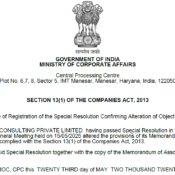🎁Gift Deed: A Comprehensive Guide🎁
🎁Gift Deed: A Comprehensive Guide🎁 2
Gifts are a wonderful way to express love, appreciation, or gratitude towards someone. In legal terms, a gift refers to the transfer of property from one person (the donor) to another (the donee) without any consideration or payment.
To formalize such transfers, a legal instrument called a Gift Deed is used. In this post, we’ll delve into the concept of Gift Deeds, including their definition, eligibility criteria for donors and recipients, required documents for gifting movable and immovable assets, and the rights attached to a Gift Deed.
Table of Contents
Toggle📜 What is a Gift Deed as per the Act?
A Gift Deed is a legal document that establishes the transfer of ownership of a property or asset from one person (donor) to another (donee) as a gift, without any exchange of money or other consideration. It acts as evidence of the gift and provides legal validity to the transfer. The Gift Deed is governed by the relevant provisions of the Transfer of Property Act, 1882, in India, and may vary in different jurisdictions.
🤝 Eligibility to Make a Gift and the Receiver
According to the Transfer of Property Act, any person who is of sound mind and has attained the age of majority (usually 18 years) is eligible to make a gift. Minors are also eligible to receive gifts, but they must have a legal guardian who can accept the gift on their behalf. The donee can be an individual, a group of individuals, or even a legal entity like a trust or charitable organization.
📄 Documents Required for Gifting Assets
- Gift Deed: The primary document required for gifting any asset is the Gift Deed itself. It should contain the details of the donor, donee, description of the gifted asset, terms and conditions (if any), and the intention to gift the asset.
- Identification Documents: The donor and donee need to provide their identification documents, such as Aadhaar card, PAN card, or passport, to establish their identity.
- Proof of Ownership: The donor must provide the necessary documents to prove their ownership of the gifted asset, like the property title deed or ownership documents for movable assets.
- Valuation Certificate: In some cases, it may be necessary to obtain a valuation certificate from a registered valuer for assets like jewelry, artwork, or antiques to determine their fair market value.
- Stamp Duty and Registration: Depending on the nature and value of the gift, stamp duty and registration charges may apply.
📜 Rights Attached to a Gift Deed
Once a gift is made through a valid Gift Deed, certain rights and obligations arise:
- Ownership: The ownership of the gifted asset is transferred from the donor to the donee.
- Possession: The donee gains the right to possess and enjoy the gifted asset.
- Transferability: The donee has the freedom to transfer or sell the gifted asset, unless specifically restricted in the Gift Deed.
- Revocation: In most cases, a gift made through a Gift Deed is irrevocable unless there are specific provisions allowing revocation in the deed itself.
- Tax Implications: It is important to consider any applicable tax implications, such as gift tax or capital gains tax, depending on the jurisdiction and the nature of the gift.
📜 Stamp Duty rate on Gift Deed📜
If you’re considering transferring property to a blood relative, it’s essential to understand the rules and regulations regarding stamp duty on gift deeds. A gift deed is a legal document used to transfer ownership of immovable property voluntarily and without any consideration (monetary payment) involved. In Karnataka, the stamp duty on gift deeds for blood relatives is subject to specific provisions and rates.
📋 Gift Deed in Blood Relation:
When a property is gifted between individuals who share a close blood relationship, such as between parents and children, siblings, or grandparents and grandchildren, it falls under the purview of the provisions governing gift deeds in Karnataka. It is crucial to establish the relationship clearly to avail the benefits of reduced stamp duty rates.
1️⃣ Gift Deed Registration within Family members:
The stamp duty rate for gift deeds involving family members, was Rs.1000, Plus Cess, and Registration Fees of Rs.500. only
2️⃣ Gift Deed Registration – Non-Family members:
The stamp duty rate is 5% of the market value, plus Cess, Plus Registration.
📜 Important Considerations:
Here are a few essential points to keep in mind when executing a gift deed in Karnataka:
1️⃣ Documentation: A gift deed must be executed on non-judicial stamp paper, signed by the donor and the donee, and registered with the sub-registrar’s office within the jurisdiction where the property is located. It is advisable to consult a legal professional to ensure compliance with all necessary documentation requirements.
2️⃣ Gift Tax: While gift deeds among blood relatives do not attract income tax implications, it is essential to be aware of any gift tax provisions that may be applicable under the relevant tax laws. Consultation with a tax advisor is recommended to understand the tax implications of such transactions.
3️⃣ Due date of Registration of Gift Deed: Please note that, the Gift deed must be registered within 4 months from the date of signed on the Gift Deed, delay from 4 months to next 8months, can be registered with 10 times of registration fees as penalty, subject to approval from Registrar, however after 8 months, it is not eligible for registration.
🏢Landlord’s Gift to Taralablu Trust: Karnataka HC’s Ruling 🏢
In a recent case/ May/2023, the Karnataka High Court ruled that a gift made through a Gift Deed cannot be revoked unless the right of revocation is explicitly mentioned in the deed. The dispute involved a piece of land gifted by G Siddappa to Sri Tharalabalu Jagadguru Education Society for a hostel. However, Siddappa later executed a cancellation deed. The court held that since the gift deed had no provision for revocation, the cancellation was invalid. The judge emphasized the need to clearly specify revocation rights in the deed itself.
————————————————————————————————————
Gift Deed Format
Gift Deed
This Gift Deed (hereinafter referred to as the “Deed”) is made on this [Date] by [Husband’s Name], hereinafter referred to as the “Donor,” in favor of [Wife’s Name], hereinafter referred to as the “Donee.”
WHEREAS, the Donor is the absolute and lawful owner of the property described below, which was acquired through a registered sale deed with reference no. [Sale Deed Number], dated [Date]:
Property Details: Property Type: Residential House Address: [Complete Address of the Property] City: Bangalore, Fair Market Value: [Enter Fair Market Value of the Property]
AND WHEREAS, the Donor, out of love and affection, desires to gift the said property to the Donee, who is his lawful wife.
NOW, THEREFORE, in consideration of the love and affection towards the Donee and for other valuable consideration, the receipt and sufficiency of which are hereby acknowledged, the Donor hereby gifts, transfers, and conveys the property mentioned above to the Donee, with all the rights, title, and interest therein.
Rights and Obligations:
-
- Ownership: The ownership of the property is hereby transferred from the Donor to the Donee as a gift, and the Donee shall have full rights of ownership over the property.
- Possession: The Donee shall have the right to possess and enjoy the property without any hindrance or interference.
- Transferability: The Donee has the freedom to transfer, sell, or dispose of the property as per her discretion.
- Revocation: The Donor hereby declares that this gift is irrevocable, and he shall not have any right to unilaterally revoke this gift unless a court of law declares it invalid.
Revocation Rights: The Donor reserves the right to revoke this gift under the following circumstances:
- If a court of law determines that the Donee has engaged in dishonesty or fraudulent activities relating to the property.
- In the event of a divorce or dissolution of marriage between the Donor and the Donee.
- If the Donee fails to fulfill her obligations or breaches the terms and conditions specified in this Deed. The Donor may exercise the right of revocation by initiating legal proceedings seeking cancellation of this Gift Deed.
6.Tax and Legal Compliance: The Donee shall be solely responsible for any applicable taxes, charges, or legal obligations associated with the ownership and possession of the gifted property.
- Indemnification: The Donor hereby indemnifies the Donee from any claims, disputes, or encumbrances related to the property arising prior to the execution of this Deed.
- Governing Law: This Deed shall be governed by and construed in accordance with the laws of [Jurisdiction].
- Entire Agreement: This Deed constitutes the entire agreement between the Donor and the Donee regarding the gift of the property and supersedes any prior agreements or understandings, whether written or oral, in relation to the same.
IN WITNESS WHEREOF, the Donor has executed this Gift Deed on the date first above written.
[Donor’s Name] [Donor’s Signature]
[Witness 1] [Witness 1’s Name] [Witness 1’s Address] [Witness 1’s Signature]
[Witness 2] [Witness 2’s Name] [Witness 2’s Address] [Witness 2’s Signature]
Conclusion
Gift Deeds are legal instruments that facilitate the transfer of ownership of assets as gifts. They provide a secure and legally recognized method of transferring assets without any consideration. If you are considering making or receiving a gift, it is advisable to consult Prakasha & Co Legal and Tax Advisory in Bangalore.
Like Us On Facebook

Our Client's Review
EXCELLENTTrustindex verifies that the original source of the review is Google. Best place to file ur GST n IT returns .. They respond quickly, communicate well and get ur work done as per ur needs in a very short time ..Posted onTrustindex verifies that the original source of the review is Google. Best place for Income tax filingPosted onTrustindex verifies that the original source of the review is Google. Of all the CA, CS teams I have interacted with, they are the most prompt and organized. I have taken their services for almost 3 years now for various things like income tax queries, income tax filing, networth certificates, and compliance certificates. They always display a clear understanding of the law and are also able to explain it to you in layman terms. Overall a very resourceful and courteous team. Thank you for the support!Posted onTrustindex verifies that the original source of the review is Google. Best company secretary I bangalore ever seen such quick quality servicePosted onTrustindex verifies that the original source of the review is Google. Prakasha & Co has been a lifesaver for me when it comes to my tax dispute and filings with IT office. They are always very responsive and helpful whenever I have any questions or issues, I recently had an issue with my sister business GST filings, and they were able to quickly identify the issue and help me resolve it. They really go above and beyond to make sure their clients are taken care of.Posted onTrustindex verifies that the original source of the review is Google. ''The team at Prakasha& Co made sure my company was compliant with all the legal requirements. Their attention to detail and timely response was truly remarkable."Posted onTrustindex verifies that the original source of the review is Google. "I was impressed with the level of customer service provided by Prakasha& Co. They were always available to answer my questions and provide guidance throughout the company registration process."
Important Links
- Top 10 GST Registration Consultants in Bangalore
- Top 10 Best Income Tax Lawyers in Bangalore
- Top 10 Trademark Registration Consultants in Bangalore
- GST Registration in Bangalore
- Private Limited Company Registration in Bangalore
- Partnership Firm Registration in Bangalore
- Proprietorship Registration in Bangalore
- Trademark Registration in Bangalore
- Audit Frim in Bangalore
- CA Firm in Bangalore
- Accounting Services in Bangalore
- GST Lawyers in Bangalore
- Payroll Services Provider in Bangalore
- Payroll Consultant in Bangalore
- Income Tax Lawyer in Bangalore
All Categories
- Audit
- Blogs
- Bookkeeping Services
- Company Registration
- Company secretary Legal & Chartered Accountant
- Digital Signature Certificate (DSC) Services
- FSSAI Registration and Consultation
- GST
- Income tax
- Partnership Firm Registration
- Payroll Services
- Risk Management Services
- Startup Registration Process
- Trademark Registration
- Uncategorized








